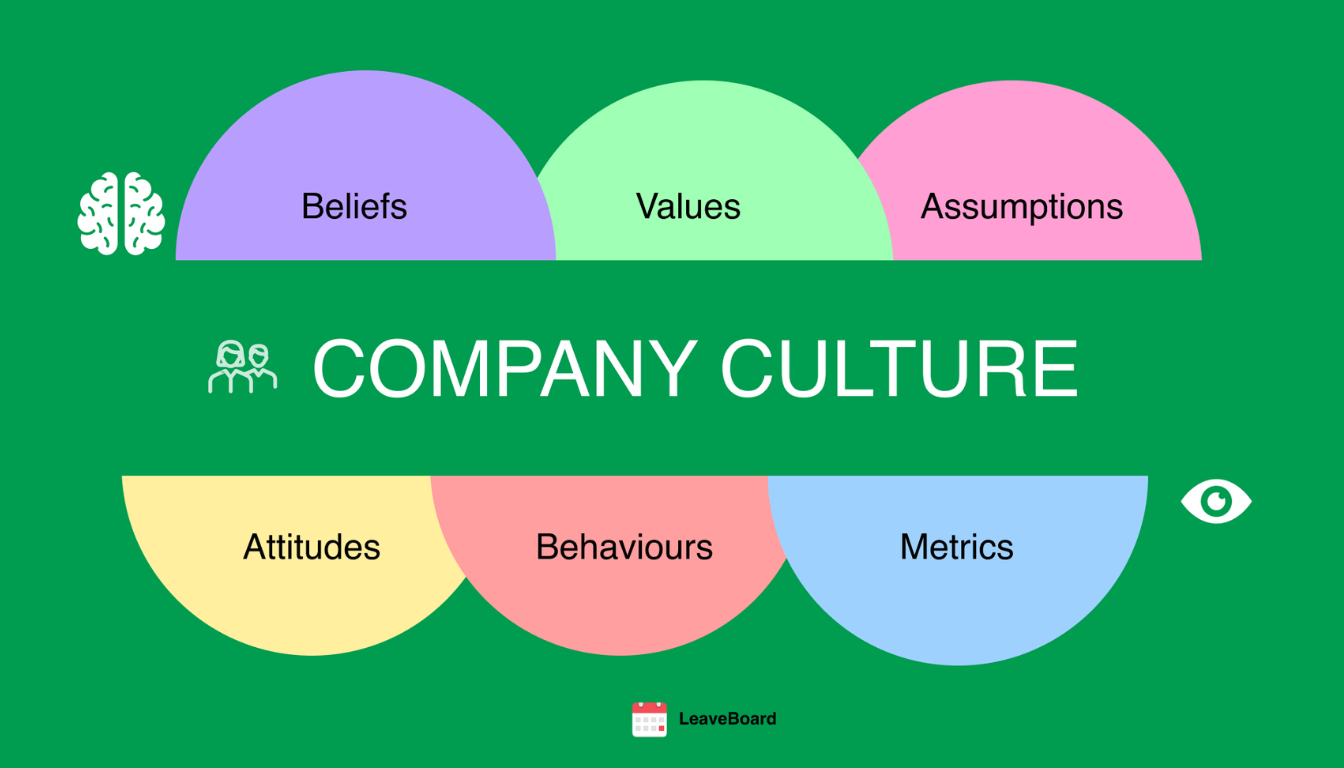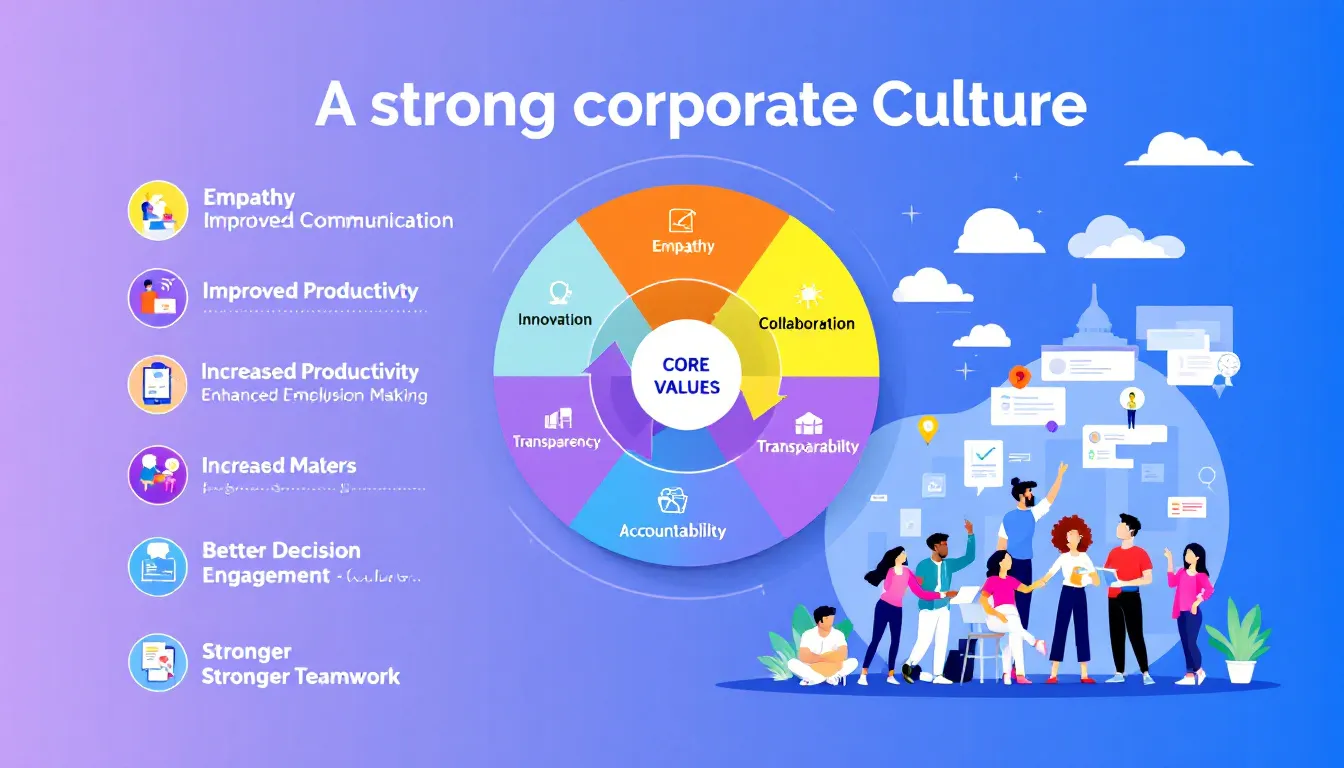Top 9 Best Corporate Culture Examples for 2025

Want to know which companies have the best corporate culture examples? In this article, we’ll highlight ten organizations that excel in creating exceptional work environments. You’ll learn about their unique practices in employee engagement, innovation, and shared values. Explore now to see which companies are leading the way in 2025.
Key Takeaways
- A great corporate culture fosters employee engagement and satisfaction, leading to better organizational performance.
- Companies like Alphabet Inc. and Patagonia exemplify how aligning company values with employee beliefs enhances motivation and loyalty.
- Implementing best practices for corporate culture includes aligning new hires with values, recognizing employee contributions, and promoting open communication.
What Makes a Great Corporate Culture?

Corporate culture is the backbone of any successful organization. It is defined by the shared environment, values, beliefs, and behaviors that guide employee interactions and decisions. But what sets apart a great corporate culture from a mediocre one? This distinction often reflects the organizational culture of the organization.
Key elements that contribute to a great corporate culture and company culture include shared values, open communication, and employee engagement. These factors foster a sense of belonging among workers, making them feel like an integral part of the organization. When employees feel connected to the company’s mission and values, they are more likely to be engaged, productive, and motivated to contribute their best efforts. A strong organizational culture enhances these dynamics, creating a great culture, a good culture, and strong cultures.
A positive workplace culture leads to increased employee engagement, employee retention, and satisfaction, ultimately contributing to higher organizational performance and enhanced customer interactions. When employee behavior is positive, employees interact happily and are engaged, they are more likely to deliver exceptional service, driving customer loyalty, employee loyalty, business success, and business performance.
Alphabet Inc. (GOOGL)
Alphabet Inc., the parent company stand of Google, exemplifies how prioritizing corporate culture can lead to motivated employees, market leadership, and a meaningful impact. Operating with a flat organizational structure, the company focuses on encouraging collaboration and communication across all levels, breaking down traditional hierarchy culture and fostering a sense of equality and shared purpose.
At Alphabet, data-driven decision-making is a cornerstone of the company’s culture. This approach not only fosters an environment ripe for creative ideas but also ensures that every decision is backed by solid evidence and insights. This emphasis on innovation and informed choices keeps the company at the forefront of technological advancements and market trends.
To promote well-being and a sense of community, Alphabet offers a variety of amenities such as nap pods, free meals, and recognition of employee milestones. These perks not only enhance the work environment but also show employees that their well-being is a top priority, fostering loyalty and satisfaction.
Patagonia
Patagonia is renowned for its environmentally and ethically responsible work culture. The company’s core focus is on environmental advocacy and sustainability, integrating these principles into every aspect of its operations.
Patagonia’s commitment to environmental activism is not just a corporate strategy but a fundamental part of its identity. The company donates a percentage of its profits to environmental causes, reinforcing its dedication to sustainability. This practice not only supports global environmental initiatives but also aligns the company’s mission with the values of its employees.
Employees at Patagonia are encouraged to engage in volunteer work and support environmental initiatives, fostering a culture of activism and shared purpose. Known as ‘Global Sport Activists,’ Patagonia employees leverage their roles to promote sustainability, reflecting a strong alignment between personal values and the company’s mission.
Netflix Inc. (NFLX)
Netflix has cultivated a culture that emphasizes maintaining a team of high achievers who excel not only in their roles but also in collaboration. This focus on top talent ensures that the company remains innovative and competitive in the fast-paced entertainment industry.
The ‘keeper test’ is a unique aspect of Netflix’s culture, where leaders evaluate whether they would strive to retain an employee if they were considering leaving. This practice helps in retaining top talent and maintaining a high-performing team. It ensures that only those who truly add value to the organization stay, fostering a culture of excellence.
Netflix also promotes autonomy by encouraging employees to make their own decisions, which encourages risk taking and leads to better outcomes. This level of trust and freedom empowers employees to take initiative and drive the company forward, contributing significantly to Netflix’s successful culture.
Zappos Inc.
Zappos is famous for its unique culture focused on delivering happiness, which is deeply integrated into their core values. This approach not only enhances customer satisfaction but also creates a positive work environment where employees feel valued and motivated.
The company’s customer-focused culture prioritizes the customer experience and allows employees the autonomy to connect with customers on a personal level, without time constraints during interactions. This freedom empowers employees to deliver exceptional service, reflecting the company’s commitment to deliver.
Zappos has implemented Holacracy, a new operating model that enhances innovation and reduces traditional hierarchy. This system fosters an adhocracy culture of openness and continuous improvement, encouraging employees to contribute ideas and take ownership of their roles.
Salesforce Inc. (CRM)
Salesforce’s corporate culture is built on the principles of trust, equality, and community involvement. These core values and company values are not just buzzwords but are deeply embedded in the company’s operations and employee interactions.
The 1-1-1 model, which includes donating 1% of equity, time, and product to support community initiatives, is a testament to Salesforce’s commitment to social responsibility. This model not only benefits the community but also fosters a sense of purpose and pride among employees, enhancing overall engagement and satisfaction.
Salesforce encourages employee participation in community service, reinforcing the company’s values and mission. This emphasis on giving back and making a positive impact contributes to the company’s strong culture and ongoing success.
Google is well-known for its positive work culture, with an impressive 97% of employees reporting high satisfaction. This culture of positivity and support is a key factor in Google’s ability to attract and retain top talent.
The company offers a variety of perks, including free meals and snacks, which enhance the workplace environment and foster employee interaction. These benefits not only improve employee satisfaction but also create a sense of community and belonging.
Google’s unique gold star system rewards employees with massage credits for outstanding work, further demonstrating the company’s commitment to employee well-being. Additionally, Google provides generous parental leave, offering mothers up to 18 weeks and fathers six weeks off when welcoming a new child, showcasing their support for work-life balance.
SquareSpace
SquareSpace’s culture is described as flat, open, and creative, fostering an environment where employees feel empowered to innovate and collaborate. This flat structure breaks down traditional hierarchies, encouraging open communication and teamwork.
The company offers comprehensive benefits, including 100% health coverage, flexible vacation, and attractive office spaces, which contribute to high levels of employee satisfaction. These benefits ensure that employees feel valued and supported in their roles.
Employees at SquareSpace report high levels of satisfaction with their work environment, with 88% stating they have the appropriate resources to perform their jobs effectively. This positive perception of the workplace fosters a culture of mutual respect and support, contributing to the company’s overall success.
Chevron
Chevron’s commitment to employee well-being is highlighted by its receipt of the Platinum Bell Seal for Workplace Mental Health, underscoring its dedication to mental health. The company’s comprehensive approach to wellness encompasses physical, mental, and lifestyle aspects, ensuring holistic support for its employees.
The company culture prioritizes safety and mutual support, creating an environment where employees feel supported and valued. This focus on safety and well-being fosters a strong company culture and a strong sense of community and loyalty among employees, contributing to the company’s success and promoting a great organizational culture that people respect, as well as a great workplace culture that people can thrive in. The company’s culture fosters these values effectively, supporting a healthy culture and a clan culture, while also embracing diverse workplace cultures.
Chevron encourages regular breaks and vacations for its employees, promoting a healthy work-life balance and reducing burnout. This approach not only enhances employee satisfaction but also contributes to long-term organizational success.
HubSpot

HubSpot emphasizes flexibility and employee well-being, allowing employees to work from home and set their own schedules. This focus on results over hours worked empowers employees to balance their personal and professional lives effectively.
The company promotes employee growth through initiatives like the Fellows Program, which offers a condensed Mini-MBA experience for high-potential employees. This commitment to professional development fosters a culture of continuous learning and improvement.
HubSpot’s supportive environment, including an unlimited vacation policy, ensures that employees feel valued and motivated. This strong corporate culture contributes to high levels of employee engagement and satisfaction, driving the company’s ongoing success.
The Role of Offsite in Building Strong Corporate Cultures

Offsite gatherings play a crucial role in building and strengthening corporate cultures. These events create opportunities for employees to connect, engage, and align with the company’s mission and values, fostering a sense of belonging, community, and stronger relationships through collective behaviors.
Community-led initiatives and experiential learning during offsite gatherings promote technical skills and innovation, contributing to organizational success. By investing in offsite events, companies can enhance employee engagement and cultivate a positive and supportive work environment.
How to Implement Best Practices in Your Company

Implementing best practices to improve company culture begins with aligning new hires with the company’s cultural values. Zappos, for example, offers financial incentives for new hires to quit if they feel misaligned, ensuring that only those who truly fit the corporate culture remain.
Consistent employee recognition through employee surveys can reveal insights into company strengths and areas needing improvement to improve workplace culture. Leaders should actively demonstrate commitment to culture change by recognizing employees and engaging in transparent communication with employees, including seeking honest feedback.
Establishing a culture committee can enhance employee involvement and foster engagement across different organizational levels. Encouraging creative problem-solving sessions and celebrating team successes can further stimulate innovation and reinforce a positive workplace culture.
Summary
In summary, the top companies of 2025 exemplify the best practices in corporate culture by prioritizing employee well-being, engagement, and alignment with the company’s mission. From Alphabet’s data-driven decision-making to Patagonia’s environmental advocacy, these organizations demonstrate that a strong corporate culture is key to organizational success.
By implementing these best practices, companies can foster a positive work environment, enhance employee satisfaction, and drive business performance. As you reflect on these examples, consider how you can apply these insights to improve your own organization’s culture and achieve long-term success.
FAQs
- What makes a great corporate culture?
A great corporate culture hinges on shared values, open communication, and strong employee engagement, which together create a sense of belonging that drives organizational success. Prioritizing these elements can significantly enhance both team morale and performance.
- How does Alphabet Inc. prioritize employee well-being?
Alphabet Inc. prioritizes employee well-being by providing amenities like nap pods and free meals, along with recognizing employee milestones, fostering a supportive community culture. This proactive approach enhances overall employee satisfaction and productivity.
- What is the 'keeper test' at Netflix?
The 'keeper test' at Netflix assesses a leader's commitment to retaining an employee who is contemplating departure, ensuring that top talent is valued and a high-performing team is sustained.
- How does HubSpot promote employee well-being?
HubSpot promotes employee well-being by providing flexibility through work-from-home options, customizable schedules, and an unlimited vacation policy, fostering a strong work-life balance. This approach demonstrates their commitment to supporting employee needs.
You may also like
Unique spaces for your next offsite
Find distinctive venues for your upcoming corporate retreat.
Stay Updated with Our Insights
Get exclusive content and valuable updates directly to you.







